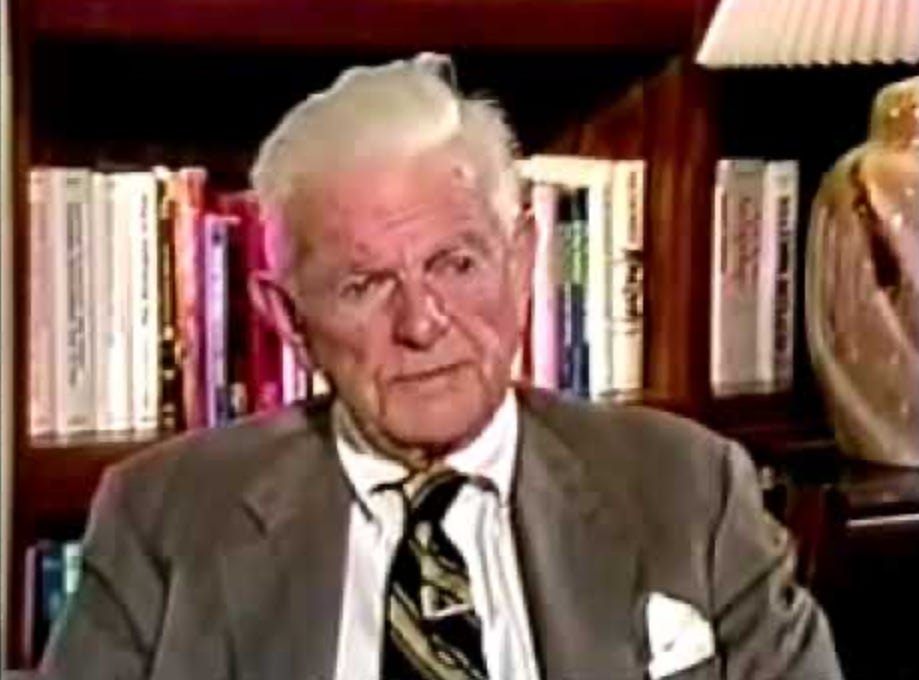“Collectivism, administered with characteristic American efficiency”
Norman Dodd on the Reece Committee investigation of tax-exempt foundations
NORMAN DODD (1899–1987) was an investment banker and independent researcher. In 1953 he was asked to serve as Director of Research for the U.S. House Select Committee to Investigate Tax-Exempt Foundations, also known as the Reece Committee.
It was formed during the McCarthy era to investigate “unAmerican activities” — which Dodd defined as “a determination to effect changes in the country by unconstitutional means.”
Tax-exempt foundations and comparable institutions (including what we call today “non-governmental organizations” and 501(c)(3) non-profit corporations) were investigated to ensure that their aims and activities were consistent with their tax-exempt status.
In a 1981 interview with G. Edward Griffin, Dodd shared facts he uncovered during his investigation that did not appear in the Congressional committee’s final report.
Dodd told Griffin that in a conversation with Rowan Gaither, then President of the Ford Foundation (and co-founder of the RAND Corporation), Dodd was told the following:
“Mr. Dodd, all of us who have a hand in the making of policies, here, have had experience either with the OSS during the war, or with European economic administration after the war. We have had experience operating under directives. These directives emanate, and did emanate, from the White House…. Mr. Dodd, we are here to operate in response to similar directives, the substance of which is that we shall use our grant-making power so to alter life in the United States, that it can be comfortably merged with the Soviet Union.”
Dodd went on to relate the story of Kathryn Casey, an attorney on Dodd’s research team. Casey was assigned to investigate the Carnegie Endowment for International Peace by reading the handwritten minute books for the Endowment, which was founded in 1908. Casey spent several weeks “spot reading” sections of the minutes covering time periods that Dodd had flagged, and she recorded her findings via Dictaphone.
Dodd relates that during their first meeting in 1908, the Carnegie Endowment trustees “raise a specific question, which they discuss throughout the balance of the year, in a very learned fashion. And the question is: Is there any means known [that is] more effective than war — assuming you wish to alter the life of an entire people? And they conclude that no more effective means than war, to that end, is known to humanity. So then, in 1909, they raise the second question, and discuss it: namely, how do we involve the United States in a war?”
And finally, “they answer that question as follows: we must control the State Department.”
Casey found that after World War I, the minutes of the Carnegie Endowment trustees reflect a shift in their interests to prevent what Dodd calls “a reversion of life in the United States to what it was prior to 1914, when World War I broke out.”
Dodd explains that the trustees decided they “must control education in the United States.” Realizing the task was too big for them alone, the Carnegie Endowment enlisted the assistance of the Rockefeller Foundation and the Guggenheim Foundation. Together they focused on the teaching of American history, and worked to cultivate their own “stable” of American history professors who would support their agenda:
“The future of this country belongs to collectivism, administered with characteristic American efficiency.”
According to Dodd, Kathryn Casey “was never able to return to her law practice. If it hadn’t been for Carroll Reece’s ability to tuck her away in a job with the Federal Trade Commission, I don’t know what would have happened to Kathryn. Ultimately, she lost her mind as a result of it. It was a terrible shock to her. It is a very rough experience, for her to encounter proof of this kind.”
SOURCE: G. Edward Griffin Interviews Norman Dodd on the Reese Committee, 1981.

